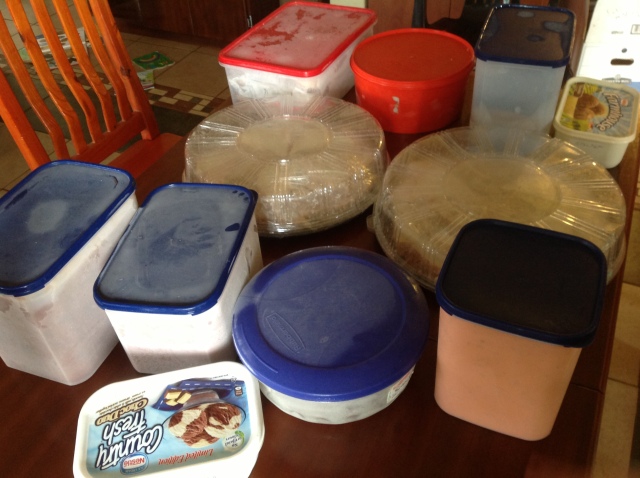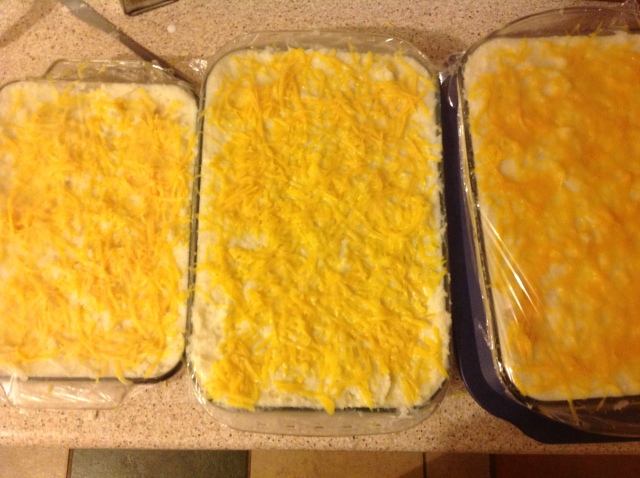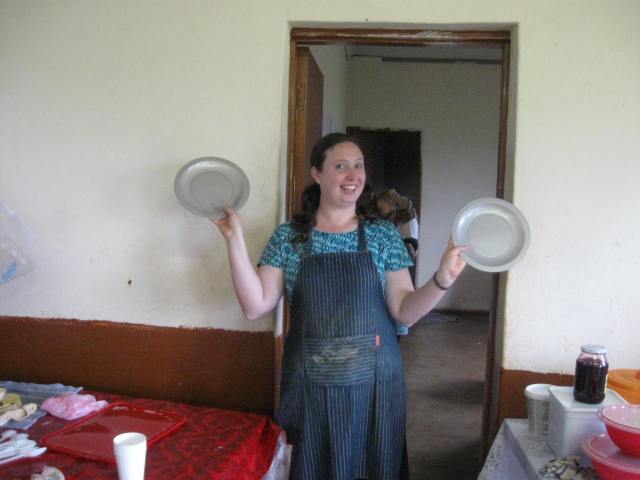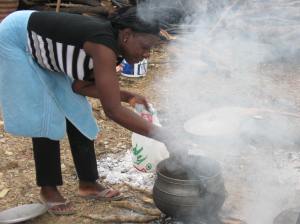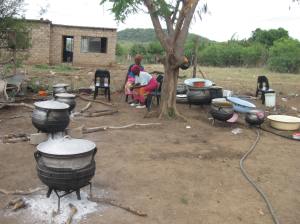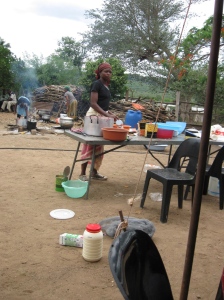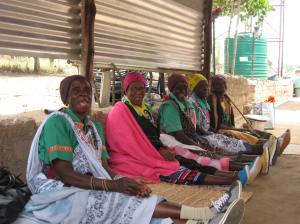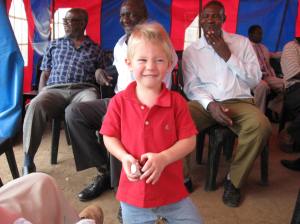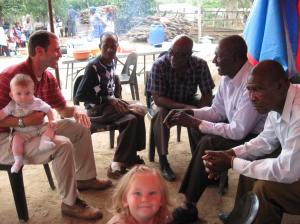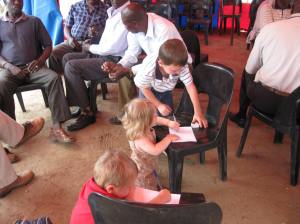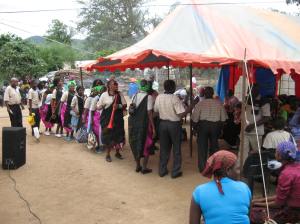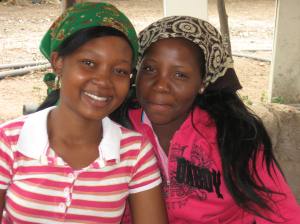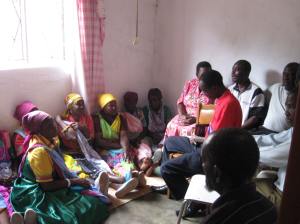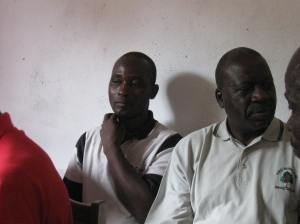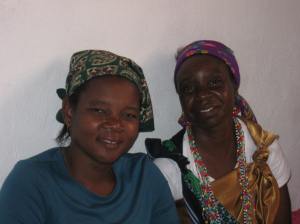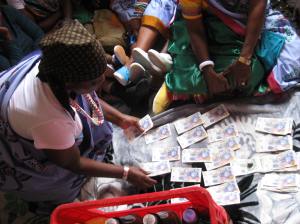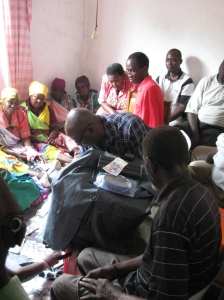One of the most-viewed posts on my personal blog is my explanation of how a typical African engagement/wedding happens, or at least the ceremony in which the bridegroom pays for his bride.
The daughter of a local pastor was “lovoriwa” last year about this time, and we were
invited to the party. Our ministry began with this pastor, surname Ngomane, learning Xitsonga and
preaching in his church to practice that Tsonga, before we started a
church another village in 2007. Through the years we have maintained a
relationship between our church and theirs; so we were excited that he
thought of inviting us to this familial party.
It is a sad
commentary on African life and culture that in the nine years we’ve
been here, we have attended countless funerals, but this was our first
ever “lovola” ceremony to get to see. It was a tiny window into old
African culture—the background that still shows itself even in this
modern day of cell phones and store-bought cornmeal powder.
We
weren’t sure how to dress, but since this is the equivalent of a wedding
for many Africans, we dressed in Sunday or almost-Sunday dress. We also
weren’t sure what time to go, since there was no official start-time. Ngomane gave us a 2-hour range, so we chose a time and we ended up
guessing fairly well, arriving about 30 minutes before the bridegroom’s
family. Maybe we’re getting better at reading between the lines and
figuring out the unspoken in their culture. :)
Here’s a breakdown of what this cultural practice looks like—from our eyes:


 |
| Ngomane's church member; notice the large jar of mayo. |
 |
| The grandmas all dressed up in their beads and head coverings, sitting together. |
We
arrived at 10:30. Several women were cooking outdoors. Their food
preparations were almost complete. Each member of Pastor Ngomane’s
family made their way to us in the next half hour and cheerfully greeted
us. We sat under the tent, raised especially for the occasion, with
several other family members and waited.

And waited some more.
And
more. By now, the kids have been oohed and aahed over, and we’re
actually having to come up with “real” conversation. ;) My husband has a great knack for this. I’m so glad I’m married
to this guy! He got these gray heads shaking their heads and
commiserating about the youth these days—you know, how they change the
Tsonga language, and they’re not doing this or that right (like the old
days).
Thankfully
I had some paper and pen from the last church service in the diaper
bag, as well as some cars. The cars kept the kids busy for the next few
hours. I tried not to think about the chicken doo mixed in the sand they
were driving the cars through. I have ceased to worry about their
clothes getting dirty. (Notice the perfect color of Callie’s
jumper—brown.)
 |
| Kids' only toys--paper, pen, and cars. |
Things
perked up when a full taxi (15-passenger van) arrived. The guests filed
in, singing, “We are coming into the Ngomane’s,” wearing matching
shirts saying, “Kubayi Ngomane Clan.” Shortly thereafter, Seth was
called to sit in on the DISCUSSION over the bride-price.
 |
| Singing They Come |
Several
Ngomane family members filled a cleared-out bedroom, and Seth (my husband) was the
drop of milk mixed in a sea of chocolate. Since neither Seth nor I knew
exactly what he’d been called away for, I did not see him for the next
two hours, which turned out to be a very taxing time period for a
missionary mom with 4 kids 5 years old and under.
Of course,
the bride's parents are there (not the bride herself—she sat outside, happy and
nervous, the entire time), along with Pastor Ngomane's father, mother, and
several of the aunts and uncles, men and women sitting together
with their respective genders. The bridegroom’s family, surname
Rihlampfu, filled out the sitting room.
 |
| Sweet bride (left), happy and nervous |
 |
| Ngomane clan in their room |
Two
messengers were sent from the Rihlampfu family to the Ngomane’s with
R4,100 (currency here). Seth stands up to give them his chair, but is
quickly motioned down by the Ngomane’s and threatened with a fine if he
does that again. (He didn’t know that they really do fine for bad
behavior! But I’m sure they were kindly teasing him in this case—though
serious that there was an image they’re trying to hold up, and Seth
wasn’t helping it!)
They copiously lay the money out on the floor
for all to see. The Ngomane family starts to warm up. But when they see
what is offered, they respond, “What did you come here to do? Give us
some kind of offer that will open our mouths. Give us a reason to talk.
These cows can’t get the whole job done.” (You can guess—cows were the
method of payment in the past.)
The messengers are sent back with a
messenger from the Ngomane’s to relay this comment. The Rihlampfu clan
returns with R5,000 following the same display ceremony as previously.
Some uncles are chiming in now. “When you have cows, you send them here,
you send them there to plow. They work for you. What is this? This gets
no work done, this is hardly anything.”
Pastor Ngomane's family wanted
hard liquor, snuff, and cigarettes as part of their payment. Pastor N. had
warned Seth in the beginning that his relatives loved drinking.
Rihlampfu comes back, carrying two cases of cold drink (pop). Since both the bride and her young man are Christians, I’m glad to see the way the
request for liquor was handled.
The groom’s family comes back a
few more times offering a new suit of clothes for the father and some
money to buy a blanket for the mother. But the Ngomane family scoffs at this:
“That’s not even half what you need to buy a blanket. She loses her
daughter, and you can’t even buy her a blanket to keep warm?”
More
money is brought in. Pastor N’s father: “Go. Go back home.” He now
starts to reference the money he was hoping for—R50,000. Some more
rhetoric: “We raised her. We fed her, we paid for her. Now you want to
come and take her for nothing.” Ngomane relays this message to
Rihlampfu. More money is brought in. Now it’s trickling in in the form
of smaller bills and coins, no more large denominations. Rihlampfu is
trying to communicate that they are running out. Total is up to almost
R25,000.
Pastor N’s father is unhappy, clearly stating now that
they must reach R50,000. Rihlampfu brings back the message, “Please we
ask for mercy. We have no more. Please we ask for water (ease).” The
Ngomane’s take a hard stance; but the bride’s parents intervene. Pastor N.: “Look, we don’t want to hurt these people. Drop the price to
R30,000, and let them owe us that small amount. I’m happy. Look at the
suit, the cold drink, all the money. I’m fine with this.” Pastor N's wife adds, “I’m happy; I don’t want to hurt these people.
This is enough.” She’s told in no uncertain terms by the patriarch of
the family (Pastor's father) that she has no say as a woman in the house. She’s not cowed
and continues to calmly state that she doesn’t want anymore.
 |
| Pastor Ngomane (left) |
 |
| The bride's mother, on left. |
Charity
is one thing; bad manners are another. Ngomane decides that Rihlampfu
must be fined R200 each for eight cultural misdemeanors that day. For
one, when they all arrived, the groom’s family didn’t greet the bride’s
family in the proper manner. Another—they hooted their horns on arrival,
signaling that they had “already won the game before they’d even
played.” Also the young men in their party did not take off their hats.
 |
| Rihlampfu messenger lays out the money. |
 |
| Is it enough? Ngomane clan counts. |
Rihlampfu
returns with thanks for the R20,000 discount, and then displays a stack
of bills to cover the last R5,000 or so. The Ngomane’s had added up
exactly what Rihlampfu’s owe them. Pastor N. reminds them to add in the
costs of the suit and cold drink in the payment amount. Calculators are
pulled out. Seth, having kept a total in his mind throughout the
process, announces the number, receiving a wide-eyed look. A family
member checks his math on the calculator and announces that
Seth was right. Pastor’s father, surprised, says, “White people!”
The
final amount settled for the bride price is R30,000 (@$4,400, depending
on the exchange rate). The families are moderately pleased with the
exchange, and you hear a specifically Tsonga cheer all the way outdoors,
signaling that the two will get married.
Seth was asked if he had to pay lovola for his wife? “No,” he responded, “people gave
me
gifts at our wedding.” ;) They rejoin, “No, but you had to get her a
ring.” His answer: “Yes, but she gets to keep that!” They agreed that he
should therefore be living with his in-laws because they are the ones
who paid (meaning he can’t take care of his wife himself). Seth ended
with, “Yeah, white people are nuts.” He was cheered by all in
attendance.
A very tired mama and kids went home with Daddy right
after this point, so I don’t know how they ended the party. Perhaps
there were a couple of speeches and songs, but if nothing else, there
was feasting and music with a DJ to run the computers and 4-foot high
speakers. I admit that I had hoped to see more for myself, but instead
had a discouraging couple of hours trying to handle the children in that
scenario. I’m sure missionary mommy moments like these will only get
easier when my kids are older. They have to!




